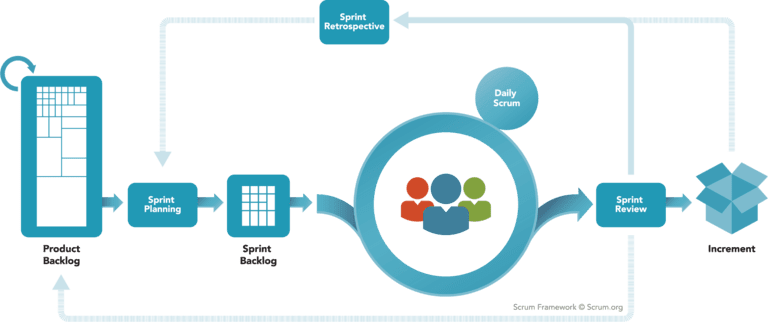What is Scrum

What is Scrum?
Scrum is a lightweight framework for managing complex problem. It is often used in software development, but can be applied to any product.
Scrum Theory and principals
Scrum is founded on empiricism and lean thinking. Empiricism asserts that knowledge comes from experience and making decisions based on what is observed. Lean thinking reduces waste and focuses on the essentials.
The three pillar of empiricism are transparency, inspection, and adaptation, and they are designed to help teams work together to achieve a common goal.
Scrum Values
Successful use of Scrum depends on people becoming more proficient in living five values:
Commitment, Focus, Openness, Respect, and Courage
Scrum Mechanics
Scrum employs an iterative, incremental approach to optimize predictability and to control risk. Scrum teams are cross-functional meaning the group of people collectively have all the skills and expertise to do the work and share or acquire such skills as needed.
The Scrum framework includes roles/accountabilities, the Scrum Master, the Product Owner, and the Developers, as well as Scrum Events, the Sprint, Sprint Planning, Daily Scrum, Sprint Review, and Sprint Retrospective.
Scrum has three artefacts, Product Backlog, the Sprint Backlog and the increment. The artefacts are designed to maximize transparency of key information.
Each artefact has a commitment to ensure transparency and focus against which progress can be measured.
The commitment for the Product Backlog is the Product Goal, for the Sprint Backlog, it is the Sprint Goal, and the Increment, it is the Definition of Done.
These commitments exist to reinforce empiricism and the Scrum values for the Scrum Team and their stakeholders.
And that is it, anything else is not part of scrum and are complimentary practices, some are useful and some can be harmful.
Scrum can work well for teams that have the following characteristics:
Complex problem: Scrum is well-suited for problem that are complex and involve a high degree of uncertainty or change. Its iterative and incremental approach allows teams to adapt to changing circumstances and deliver value early and often.
Collaborative teams: Scrum relies on teamwork and collaboration to succeed. Teams that value open communication, transparency, and trust can benefit from using Scrum.
Self-managing teams: In Scrum, the scrum team is responsible for completing the work and delivering value. Teams that are able to self-manage and take ownership of their work can thrive in a Scrum environment.
Cross-functional teams: Scrum teams are cross-functional, meaning they have the skills and expertise needed to complete the work. This allows teams to be more flexible and responsive to change.
Agile mindset: Scrum is based on the Agile principles of iteration, collaboration, and adaptability. Teams that embrace an Agile mindset and are open to change can be more successful with Scrum.
If your team has these characteristics, Scrum can be a powerful tool for managing and completing complex projects. By following the Scrum framework and embracing its values and principles, your team can deliver high-quality products in a short amount of time.
